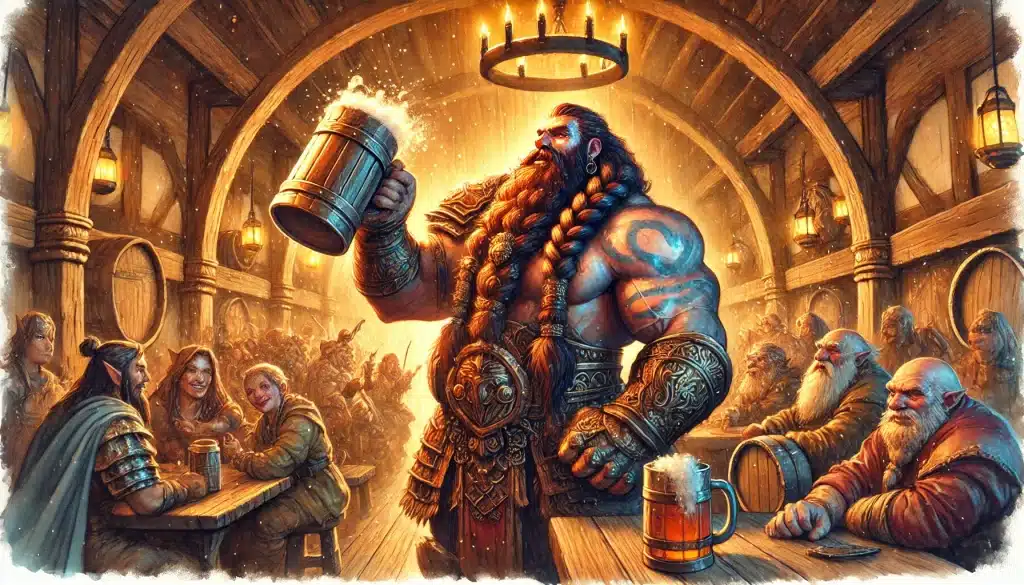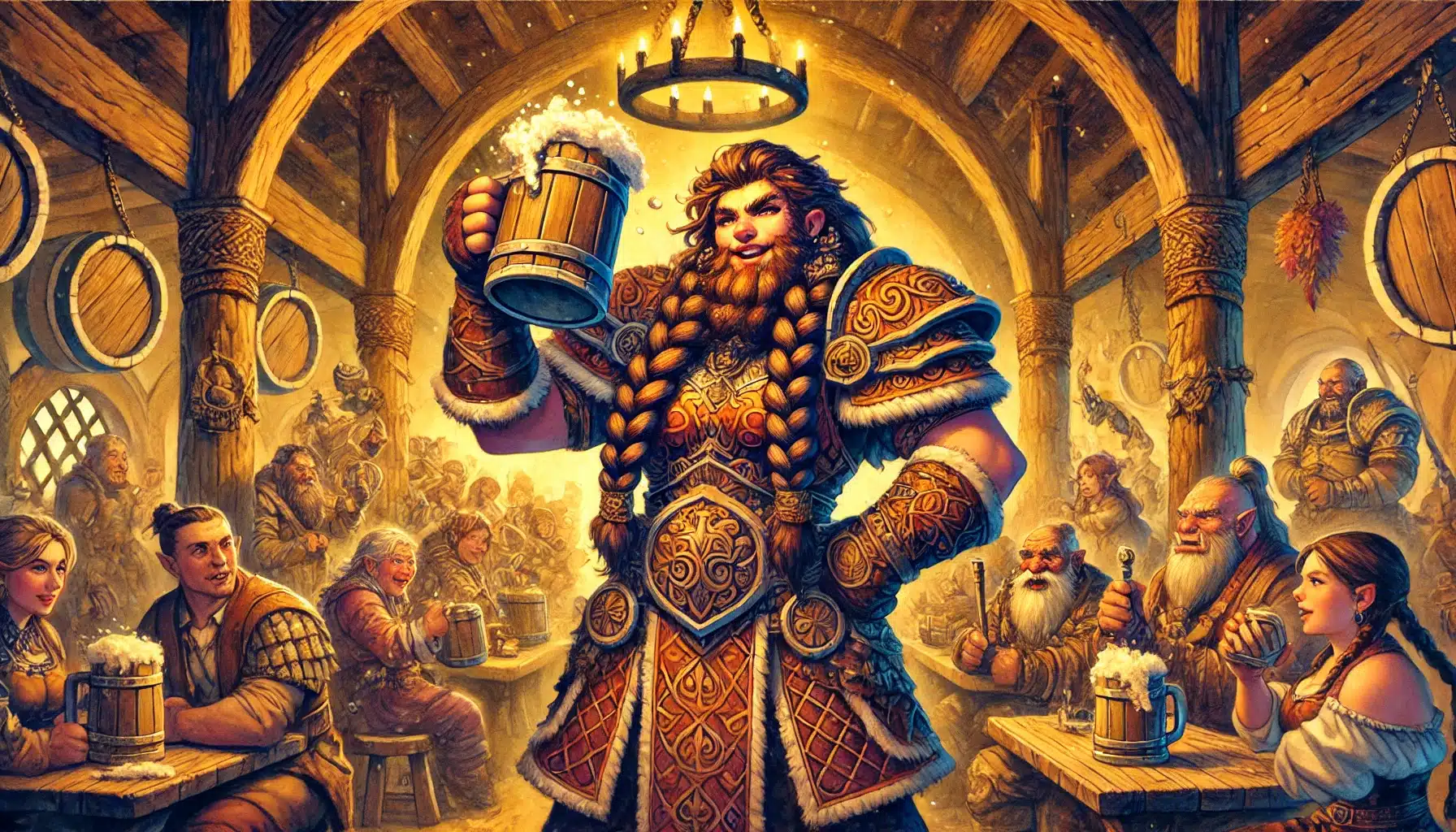In the annals of fantasy lore, dwarves have long held a special place. These stout, hardy folk are often depicted as master craftsmen, fierce warriors, and denizens of great underground cities. Yet beyond the well-trodden paths of common fantasy lies a more primal, more ancient vision of dwarven society: the mythical dwarf tribes and, of course, epic dwarf clan names.
These are not the refined, city-dwelling dwarves of high fantasy, but rather the primal clans that form the bedrock of dwarven mythology. They are the tribes that wandered the earth when it was young, who first delved into mountains and forged alliances with the very stone itself. Their names echo with the power of their ancestors and the raw essence of the earth, evoking images of a time when the line between myth and reality was blurred.
This comprehensive guide delves deep into the art of crafting names for these mythical dwarf tribes. We’ll explore the elements that make a tribal name resonate with primordial power, examine various themes and their associated naming conventions, and provide you with the tools to create your own unique and evocative dwarf tribe names.
Whether you’re a dungeon master seeking to enrich your game world, a writer crafting a new fantasy realm, or simply a lover of dwarven lore, this guide will inspire you to create tribes that feel both primitive and powerful, rooted in the very essence of what it means to be a dwarf – even if you’re talking about funny dwarf names!
Elements of Dwarf Tribal Names
Before we delve into specific naming ideas, it’s crucial to understand the key elements that can make a dwarf tribe’s name resonate with primordial power. These elements form the building blocks of our naming convention, allowing us to craft names that feel authentic and deeply rooted in dwarven culture.
- Nature-based terms: Dwarves are intrinsically linked to the natural world, particularly mountains, caves, and the earth itself. Incorporating these elements into their names not only reflects their environment but also their spiritual connection to the world around them. Examples: Stone, Rock, Mountain, Cave, Gem, Metal
- Harsh consonants: The dwarven language is often portrayed as robust and guttural, reflecting the hardy nature of the dwarves themselves. Using sounds like ‘k’, ‘g’, ‘r’, and ‘t’ can give names a rugged, powerful feel that aligns well with the dwarven aesthetic. Examples: Krag, Gorn, Thrak, Durgan
- Ancient language roots: Drawing inspiration from old Germanic, Norse, or Celtic languages can lend an air of antiquity and mystery to your tribe names. These languages are often associated with ancient, powerful cultures in our own world, and can evoke similar feelings in a fantasy context. Examples:
- Old Norse: Berg (mountain), Stein (stone)
- Old English: Eorþ (earth), Dweorg (dwarf)
- Celtic: Carraig (rock), Cloiche (stone)
- Descriptive epithets: Including words that describe the tribe’s key characteristics, history, or achievements can make the name more meaningful and memorable. These epithets can reflect physical traits, cultural values, or significant events in the tribe’s history. Examples: Ironhand, Flameheart, Deepdelver, Runecaster
- Compound words: Combining two or more words to create a single name is a common feature in many real-world ancient naming conventions. This technique can create unique, meaningful names that encapsulate multiple aspects of the tribe’s identity. Examples: Stonehammer, Firebrand, Shadowforge, Earthblood
By skillfully combining these elements, we can create names that feel authentically dwarven while also evoking a sense of ancient, tribal power. In the following sections, we’ll explore how to apply these elements to various themes, creating a rich tapestry of dwarf tribal names.
Try my AI Tabletop RPG generators...and an extensive library of content!
⚔️ Fantasy RPG Random Tables Books
Make life as a Gamemaster easier…
If you play Dungeons & Dragons, Pathfinder, or other fantasy RPGs, this
RPG random tables series
is packed with encounters, NPCs, treasure, and more. Available in eBook or print—either way, you’ll have a wealth of adventure ideas at your fingertips.
Naming Themes for Dwarf Tribes
Now that we’ve established the basic elements of dwarf tribal names, let’s explore various themes that can inspire our naming conventions. Each theme represents a different facet of dwarven culture or environment, allowing us to create diverse and interesting tribes.
Mountain Dwellers
The archetypal home of dwarves, mountains play a crucial role in dwarven mythology and culture. Tribes named after mountain-dwelling themes evoke images of dwarves who have made their homes in the heart of great peaks, drawing strength from the very stone around them.
- Stonepeak Clan: This name combines the earthly “stone” with the aspirational “peak,” suggesting a tribe that has conquered the mountains.
- Ironridge Tribe: “Iron” speaks to the dwarven affinity for metal, while “ridge” places them in a mountainous setting.
- Granitefoot Brotherhood: “Granite” is a hard, durable stone, while “foot” could refer to the base of a mountain or the steadfast nature of the dwarves themselves.
- Cavern Hammer Kindred: This name evokes both the underground dwellings (“cavern”) and the dwarven craft (“hammer”).
- Deeprock Ancestors: Suggesting an ancient tribe that dwells in the depths of the mountains.
Forest Dwellers
While less common in traditional lore, forest-dwelling dwarf tribes offer an intriguing twist on the classic archetype. These names blend earthy dwarf sensibilities with woodland themes, creating a unique subset of dwarven culture.
- Oakbeard Tribe: Combines the image of a dwarf’s beard with the sturdy oak tree, a symbol of strength and longevity.
- Rootfist Clan: Evokes both the underground nature of roots and the strength of a clenched fist.
- Mossaxe Kindred: Blends the forest floor covering (moss) with a traditional dwarven weapon (axe).
- Pinecone Warriors: An unusual name that suggests adaptation to a coniferous forest environment.
- Barkskinner Brotherhood: Implies a tribe skilled in working with trees, perhaps in a manner similar to how other dwarves work stone.
Fire and Forge
The forge is central to traditional dwarven culture, representing their skill in metalworking and craftsmanship. These names tap into the dwarven affinity for fire and molten metal, evoking images of master craftsmen and the transformative power of the forge.
- Flameheart Clan: Suggests a tribe with a passionate, fiery nature.
- Emberbeard Tribe: Evokes the image of a dwarf working so close to the forge that their beard glows with embers.
- Forgefury Kindred: Combines the central image of the forge with the intensity of fury, implying both skill and passion in their craft.
- Sootfist Warriors: Implies a tribe of warrior-smiths, their hands blackened by the soot of the forge.
- Ashfoot Brotherhood: Suggests a nomadic tribe, perhaps following volcanic activity or forest fires, leaving ashen footprints in their wake.
Earth and Stone
Drawing on geological terms, these names paint a picture of dwarves intimately connected with the minerals and gemstones of the earth. They suggest tribes with deep knowledge of the underground world and its treasures.
- Geodecracker Clan: Implies a tribe skilled in finding and opening geodes, perhaps valuing the crystals within.
- Crystalvein Tribe: Suggests a tribe that specializes in mining crystalline formations.
- Obsidian Soul Kindred: Evokes the image of dwarves with the sharp, dark nature of obsidian at their core.
- Quartzfist Warriors: Combines the hardness of quartz with the strength of a clenched fist, implying both mineral knowledge and martial prowess.
- Claymore Brotherhood: While “claymore” is typically a type of sword, here it’s used as a play on words with “clay” and “more,” suggesting a tribe that values or works with clay deposits.
Ancient and Primal
These names tap into the ancient roots of dwarven mythology and language, giving a sense of primordial power and age-old traditions. They often use elements from real-world ancient languages or mythological references to create a sense of deep history.
- Ur-Khazad Clan: “Ur-” is a prefix meaning “original” or “primitive,” while “Khazad” is the word for dwarves in Tolkien’s Dwarvish language, creating a name that means “The Original Dwarves.”
- Dwergar Tribe: “Dwergar” is Old Norse for “dwarf,” connecting this tribe to ancient Norse mythology.
- Durin’s Folk: Referencing Durin, the first dwarf in Norse mythology (and adapted by Tolkien), this name suggests a tribe that claims direct descent from the original dwarf.
- Anbarhîm Kindred: This name uses elements from Khuzdul, Tolkien’s dwarven language. “Anbar” means “stone” and “hîm” means “steadfast,” creating a name that roughly translates to “Steadfast as Stone.”
- Dhorn Warriors: “Dhorn” comes from the Proto-Germanic “dhurnaz,” a possible root for the word “dwarf.” This name suggests a tribe that maintains the most ancient dwarven traditions.
⚔️ Fantasy RPG Random Tables Books
Make life as a Gamemaster easier…
If you play Dungeons & Dragons, Pathfinder, or other fantasy RPGs, this
RPG random tables series
is packed with encounters, NPCs, treasure, and more. Available in eBook or print—either way, you’ll have a wealth of adventure ideas at your fingertips.
In the next section, we’ll explore how to combine these elements and themes to craft your own unique dwarf tribe names.

Crafting Your Own Dwarf Tribe Names
Now that we’ve explored various elements and themes of dwarf tribal names, it’s time to put this knowledge into practice. Crafting your own unique dwarf tribe names allows you to create tribes that perfectly fit your world or story. Here’s a simple formula you can use as a starting point:
[Descriptive Element] + [Nature Term] + [Group Word]
This formula provides a basic structure that you can adapt and expand upon as needed. Let’s break it down:
- Descriptive Element: This could be an adjective, a material, or a characteristic that defines the tribe. Examples: Iron, Deep, Shadow, Flame, Ancient.
- Nature Term: A word that connects the tribe to their environment or the natural world. Examples: Stone, Root, Mountain, Forge, Crystal.
- Group Word: A term that denotes a collective or tribe. Examples: Clan, Tribe, Brotherhood, Kindred, Folk.
Using this formula, we can create names like:
- Ironroot Clan
- Stormstone Tribe
- Deepmoss Brotherhood
You can also invert this formula or add additional elements to create more complex names:
- Clan of the Burning Mountain
- Shadowforge Stoneheart Kindred
- Tribe of the Eternal Caverns
Remember, these are just starting points. Feel free to experiment with different combinations and add your own unique elements. The key is to create names that are evocative, easy to pronounce, and reflective of the tribe’s character and environment.
Tips for Crafting Unique Names
- Consider the tribe’s history: Has the tribe undergone any significant events that could be reflected in their name? Perhaps they survived a great cataclysm or made a legendary discovery.
- Think about the tribe’s values: What does the tribe prioritize? Craftsmanship? Martial prowess? Spiritual connection to the earth? Try to incorporate these values into the name.
- Use symbolism: Dwarves often have a rich tradition of symbolism. Consider using animals, plants, or natural phenomena that hold special meaning for the tribe.
- Play with sounds: Try saying your created names out loud. Do they sound appropriately dwarven? Remember to use those harsh consonants we discussed earlier.
- Consider naming conventions: Some tribes might use a prefix or suffix to denote all their clan names. For example, all tribes in a certain region might end their names with “-Kazad” or begin them with “Durn-“.
- Use real-world inspiration judiciously: While drawing from real-world ancient languages can be effective, be careful not to simply copy existing names or terms. The goal is to create something that feels authentic to your world.
Examples of Complex Tribe Names
Let’s look at a few examples of more complex tribe names and break down their components:
- The Soulforge Ironbeard Covenant
- “Soulforge” suggests a deep, spiritual connection to smithing
- “Ironbeard” is a classic dwarven descriptor, implying toughness and tradition
- “Covenant” instead of a more common term like “Clan” implies a sacred pact or agreement
- Clan Grimaxe of the Everdeep Caverns
- “Grimaxe” combines a mood (grim) with a traditional dwarven weapon
- “Everdeep Caverns” gives us information about where they live
- The Emberheart Stonesinger Kindred
- “Emberheart” suggests a fiery passion or connection to forge-work
- “Stonesinger” implies a mystical connection to stone, perhaps through music or magic
- “Kindred” suggests a family-like bond among tribe members
By combining various elements in creative ways, you can craft names that are not only evocative but also hint at the rich culture and history of your dwarf tribes.
Mythical Dwarf Tribes
Crafting names for mythical dwarf tribes is an art that blends linguistics, mythology, and creativity. By drawing on elements of nature, ancient languages, and the core aspects of dwarven culture, you can create names that resonate with primordial power and bring your fantasy world to life.
Whether your dwarves dwell in the heart of mountains, the depths of ancient forests, or realms yet unimagined, these naming conventions will help you create tribes that feel authentic, primitive, and powerful. The names you create can hint at rich histories, complex cultures, and the unique characteristics that set each tribe apart.
Remember, the best names are those that spark the imagination. They should make the reader or player want to know more about the tribe, to explore their customs and uncover their secrets. A well-crafted name can be the seed from which entire storylines grow.
As you apply these techniques to your own worldbuilding, don’t be afraid to experiment and push boundaries. While we’ve focused on traditional dwarven themes, there’s always room for innovation. Perhaps you’ll create seafaring dwarf tribes with names that echo the rhythm of waves, or sky-dwelling dwarves whose names speak of wind and cloud.
Let your imagination run wild, and may your dwarven clans echo with the names of legend! The deep places of the world await, ready to be populated with tribes as unique and enduring as the stone itself.










